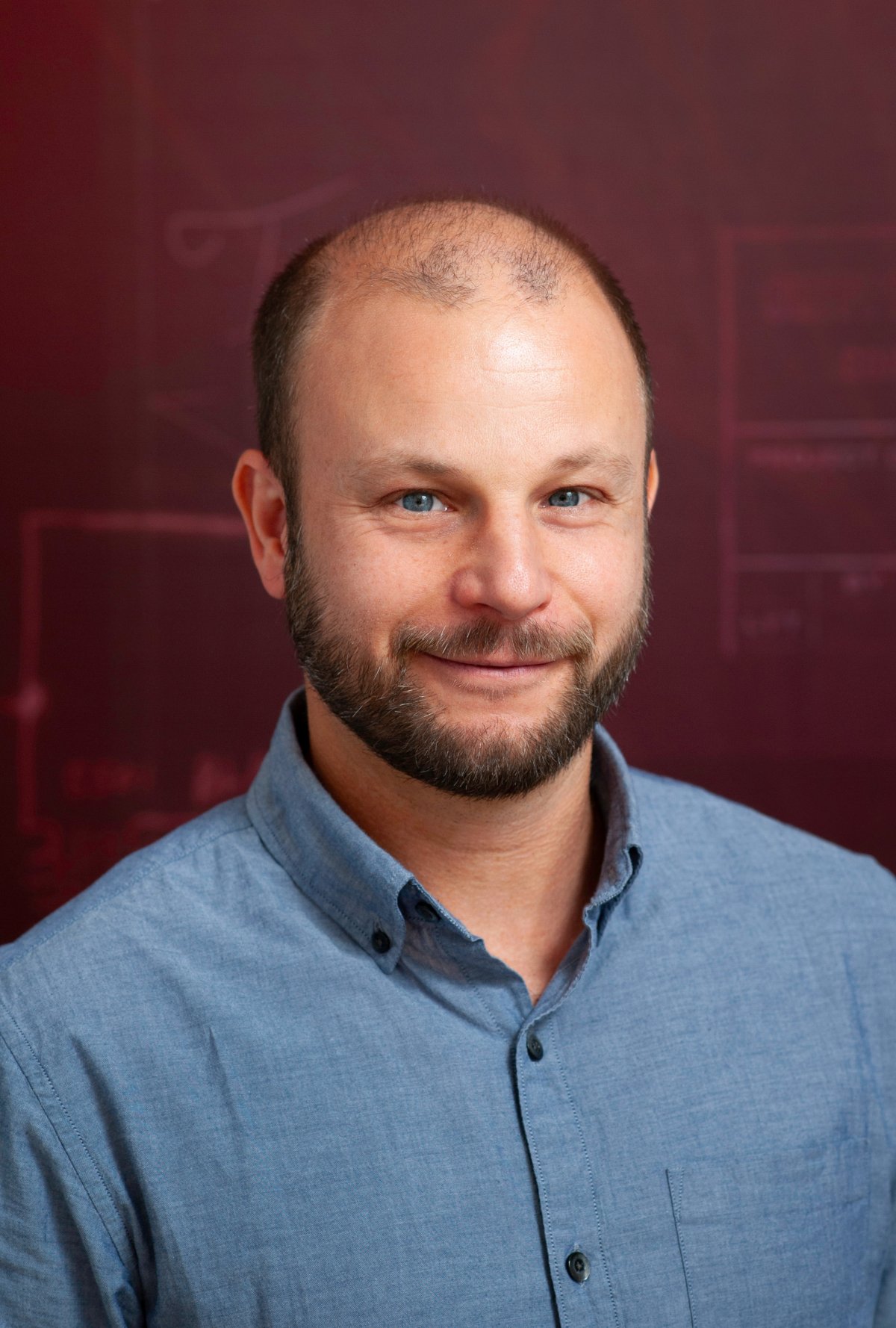Ph.D. in Computer Science overview
Looking to make your mark on the computer science community? Our doctoral program prepares students for careers focused on research and innovation. Whether you dream of working in the industry or in academia, a Ph.D. in computer science is the jumping off point for ground breaking discovery.
The Ph.D. in Computer Science is a research degree which culminates in a unique dissertation that demonstrates original and creative research. The program consists of three components: coursework, research, and thesis preparation.
Early on in your career as a graduate student, you will take courses to fulfill background, breadth and supporting program requirements. You will also take courses that help to develop and refine your research writing skills; these skills include information analysis and synthesis as well as written and verbal presentation capabilities. This part of your graduate career ends when you cross the threshold presented by the Preliminary Oral and Written Examinations (WPE and OPE). Taken in conjunction, these examinations serve as an early test of your research ability.
Once you have passed the WPE and OPE, you will be formally admitted to Ph.D. candidacy and are ready to begin the second phase of your career as a doctoral student. During this phase, your coursework lightens and your research increases as you focus on the definition and pursuit of your specific thesis topic and begin to prepare for your Thesis Proposal Examination. The Thesis Proposal Examination should be taken 1-2 years after passing the Preliminary Oral Examination and is a presentation pertaining to research directly related to your thesis proposal. This examination will test the full range of your expertise regarding your thesis topic in order to evaluate your preparation for thesis research and the suitability of your thesis research plan.
Once you pass the Thesis Proposal Examination, you will be in the full swing of research. During this stage, you will synthesize all of the skills you have learned up to this point and use them to distill the material that will become the core of your doctoral thesis. Your days and nights will be filled with intense thesis preparation and research into your thesis topic and finally you will produce a complete thesis dissertation document which you will defend orally during your Final Oral Examination and Thesis Defense. The successful completion of these activities yields your Doctor of Philosophy (Ph.D.) in Computer Science!
Throughout your career as a doctoral student you will receive support from your Academic Advisor(s), peer and research groups, and the departmental program administrator as well as a number of individuals across campus who work to best facilitate your progress through your degree program. Our primary goal is to make sure that your experience is positive, productive, and prepares you for a successful career beyond the University of Minnesota. The entirety of the Ph.D. process is complex and at times, rife with academic and administrative requirements. If you have questions regarding your individual degree plan, please do not hesitate to reach out to your advisor, the Director of Graduate Studies or the Graduate Program Coordinator for help.

Overview
A total of 55 credits are required to complete the Ph.D. in Computer Science. This includes 31 coursework credits and 24 thesis credits with a GPA of 3.45 or higher.
Coursework credits
Each student must complete 31 credits of graduate coursework, including:
- 16 graduate credits from 5xxx or 8xxx courses with a CSCI designator (with a grade of C- or better)
- 15 credits of breadth courses (5 courses), at least one from each category.
- 1 credit of CSCI colloquium (CSCI 8970)
- 6 credits of supporting program coursework or 12 credits from a minor program
- CSCI 8001/8002 unless advised otherwise by research advisor (Introduction to Research in Computer Science I and II)
- Other graduate-level credits to reach a total of at least 31 credits which may include related field courses from programs other than CSCI or courses for a graduate minor
Students have eight calendar years to complete their degree per University requirements.
Transfer credits from a previously acquired M.S. degree may apply to your Ph.D. program. Please speak with the Graduate Program Coordinator for information on transfer credit.
Breadth
Breadth coursework consists of five (5) courses (typically 15 credits) taken within three (3) subject areas. The breadth requirement exists to help expose the student to diverse computer science research topics and methods. There is 3.45 GPA minimum requirement for this coursework.
Supporting program courses
Supporting program courses are defined as a minimum of six (6) credits from a supporting program outside of the computer science department. These six credits can be a part of the 12 credits counted towards a minor. A minor is optional for the Ph.D. in Computer Science.
Background knowledge
Background knowledge courses cover concepts that are integral to a minimal core body of knowledge that all computer science Ph.D. students are expected to posses. These concepts are required prerequisites and all students in the Ph.D. program are required to fulfill these background requirements.
In addition to coursework credits, a minimum of 24 thesis credits are required in order to complete the Ph.D. program. These courses may only be taken following the completion of the WPE/OPE and admission of a student to Ph.D. candidacy.
It is the recommendation of the department that you maximize the thesis credits you take each semester and it is our hope that you will complete the thesis credits in two (2) semesters. Most students will be able to take half in one semester and the other half the next semester. If you still have some classes to take, you can register for the class(es) and then register thesis credits for the rest of the credits, up to the maximum allowed each semester of 14 credits total
When you have completed all of your thesis credits, you will be put in a reduced fringe classification, which allows you to only register for one credit, CSCI 8444 which is designated as the Ph.D. full-time equivalent credit. This credit gives you full-time status for your visa requirements for international students and also full-time status if you hold a graduate assistantship. Your assistantship will only pay for one credit, so if you take any additional credits after you have completed all of your thesis credits, the tuition for those credits will be your responsibility.
For international students who wish to do CPT during the summer and to register for CPT in the fall, you should not register for CSCI 8444 but instead request a reduced course load and submit to ISSS. For those who hold an assistantship, you must also submit a Special Graduate Assistant Registration Tuition Benefits Status Request form. This form must be submitted before the semester begins and is to be signed by your advisor, your employer (your advisor if an RA, by the DGS if TA) and then by the DGS. It should be submitted to the office and we will make sure it has the DGS signature and then fax it to the Grad Assistant Office. If you have any questions about the distribution of course and thesis credits over your career, please be sure to discuss with the Graduate Program Coordinator.
- Students who take six (6) credits or more are considered full-time graduate students. All international students and students who hold a graduate assistantship, fellowship, or traineeship are required to be full-time students.
- Almost all of the graduate level courses in computer science (5000 level and above) are 3 credits each.
- Special topics courses (CSCI 5980 or 8980) are courses taught one time only and are good options if the topic is of interest to you. However, please note that these do not count towards breadth requirements.
- All computer science courses must be taken A/F (unless only offered S/N, such as colloquium or plan B project), and no more than one-third of the courses that will count towards your degree can be taken on the S/N basis.
- Students must maintain a minimum GPA of 3.45 for courses counting towards your degree and no courses with a grade below a C- can be included.
- Students in the Doctoral program can use a maximum six (6) credits of directed research or independent study for elective credits. This is defined as CSCI 5991/5994/8991/8994
All requirements for the doctoral degree must be completed and the degree awarded within five calendar years after passing the preliminary oral examination. Graduate School policy dictates a departmental annual review of Ph.D. progress for all students. Each fall, computer science Ph.D. students will be required to complete an annual review form. This form is used by the student’s research advisor to note student progress through the program. All forms are reviewed by the Director of Graduate Studies for satisfactory progress. Progress Guidelines are available in Appendix A of the Graduate Student Handbook.
Advising
The Graduate Program Coordinator can answer most questions and advise students on degree requirements, department procedures, or general issues about being a graduate student. All new students are expected to meet with her upon arrival as well as several times throughout your graduate career in order to best facilitate your program.
The Director of Graduate Studies is the official advisor of record for all students, unless an advisor was assigned at the time of admission. Only faculty with graduate education responsibilities are eligible to serve as advisors for graduate students. The advisor-advisee relationship is a mutual and an advisor must agree to advise any student. Once a student determines his or her advisor they will fill out a Declaration of Advisor form. A student may change advisors at any time using the same form. Please note that the new and the previous advisor must sign to acknowledge this change.
Most Ph.D. students have been assigned advisors in their field of interest at the time of entry into the university. Students are encouraged to talk to their assigned advisor as well as other faculty members in their interest area to determine if their assigned advisor is best suited to their research goals. It is not uncommon to discover that your permanent research advisor is different from your pre-assigned one. You are expected to take some time to look around, talk with professors and other graduate students, and then talk with your prospective advisor. We expect you to find an advisor by the end of your first year in the program. Advising is a mutually voluntary arrangement. You never will be obligated to work with someone against your choice, and no faculty member is obligated to take on any particular student.
For questions regarding the advising process please contact the Director of Graduate Studies.

Stephen Guy
Associate Professor, Director of Graduate Studies
5-225F Keller Hall
612-625-3368
sjguy@umn.edu
